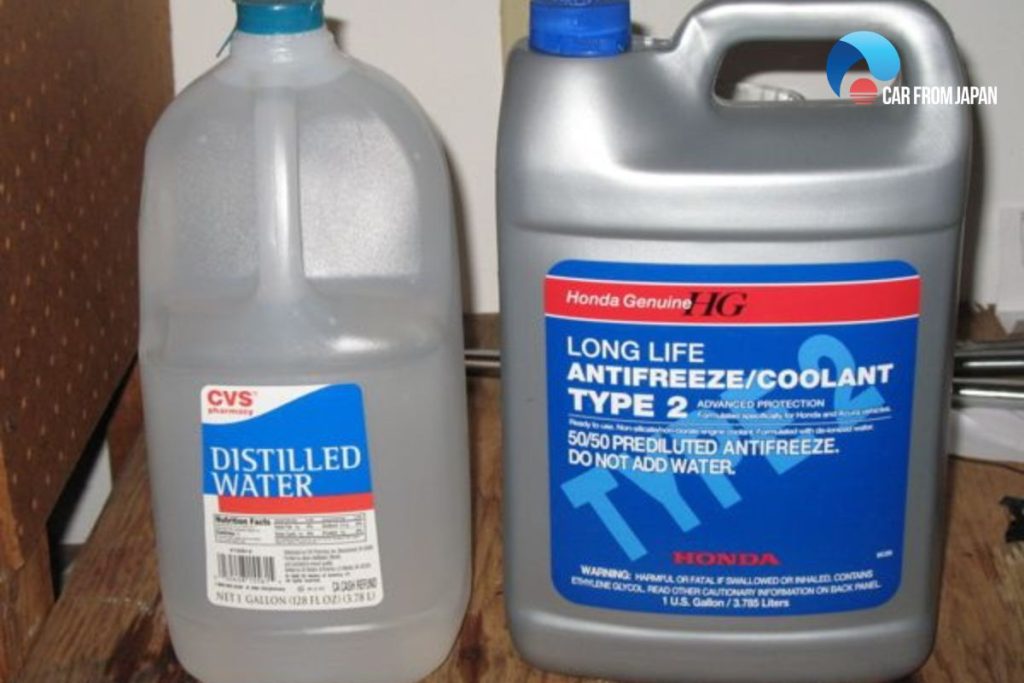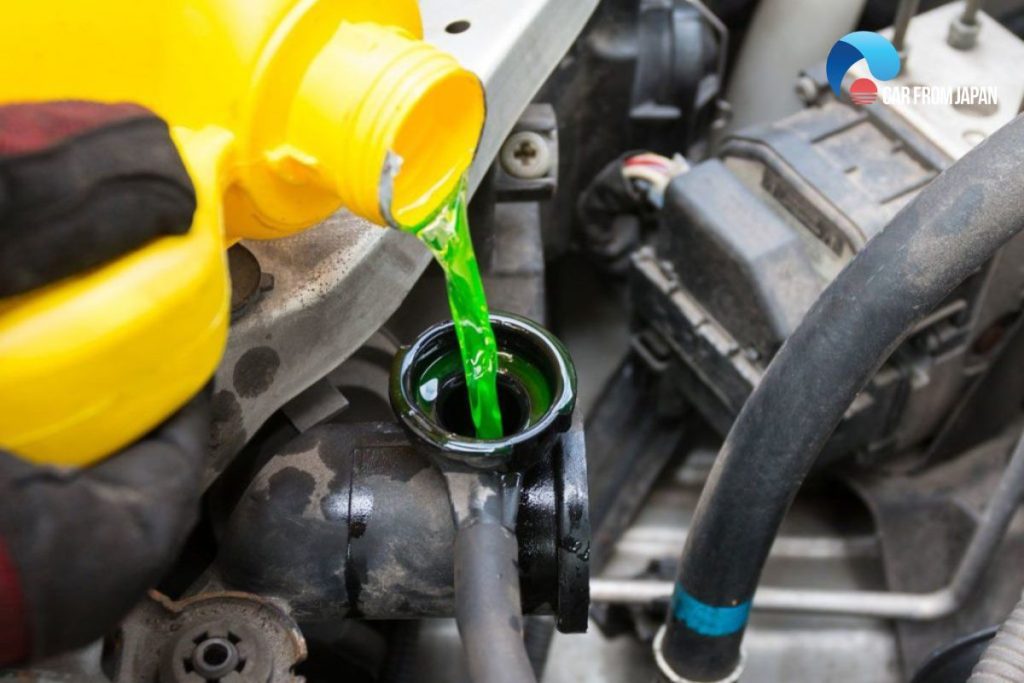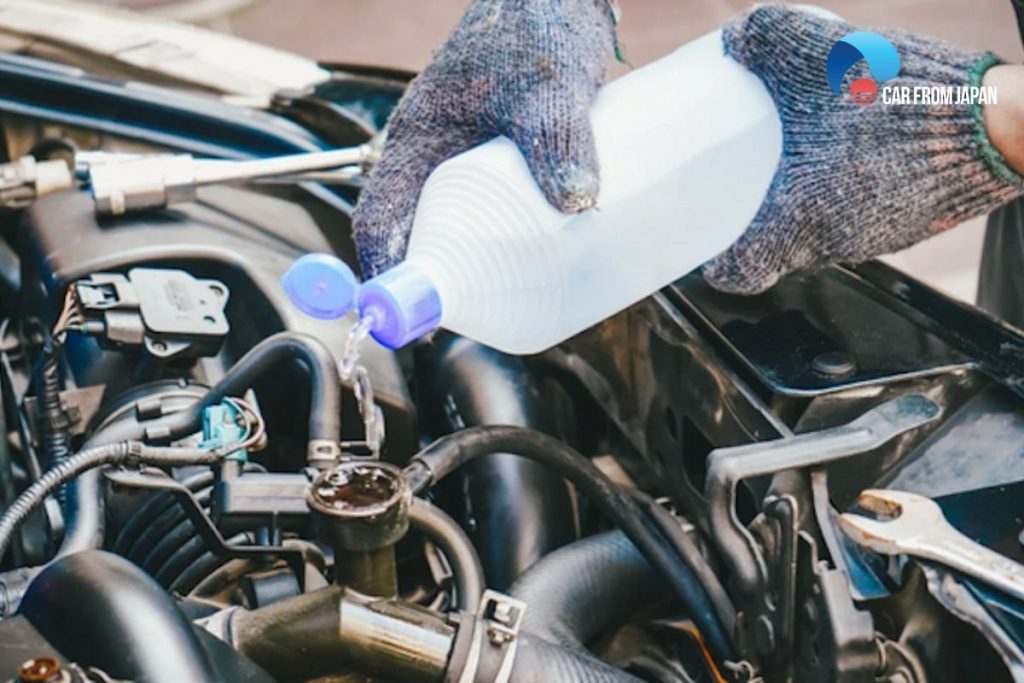There’re endless debates on the internet about which fluid you should add to the car radiator: distilled water or coolant?
Many motorists have heard that distilled water is the best choice for the car radiator and you can use the distilled water as coolant.
So you may wonder should I use distilled water in my radiator? Do you really think using distilled water will be better than coolant or antifreeze?
If you are still not sure about the answer, let’s scroll down to come nearer to the definitive answer in this post to know how to take care of your radiator the best.
Contents
- Should I Use Distilled Water In My Radiator As Coolant?
- Water vs Coolant: What Are The Differences?
- Why Using Distilled Water In Radiator Not Be Recommended?
- Is Coolant Fluid A Better Option For Your Radiator?
- Which Types of Water You May Put Into The Radiator?
- Can We Mix Water With The Coolant In The Radiator?
- How To Properly Mix Distilled Water With Antifreeze?
- Final Words
Should I Use Distilled Water In My Radiator As Coolant?
Many drivers confuse the cooling fluid as it only has the effect of “soothing” the engine parts on the car, so use distilled water instead of a specialized coolant.
But most importantly, some of us have not properly understood the function of the radiator in the car engine which leads to us not choosing the right fluid for this part.
In addition, as fuel prices go up, radiator coolant costs can be added to your car’s cost. So it will be easy for drivers to take the handy and cheaper solution like distilled water.
But the question is: Can you put water in your radiator?
You can use the distilled water (pure water) in emergencies or in remote and isolated places where a specialized coolant cannot be found, when your engine is overheating, you can add distilled water to keep the car moving.
In such situations, putting distilled water can help to prevent your radiator from dry running and overheating the engine.
While driving, if you notice the temperature gauge turns into a red light or overheating engine, this is a warning sign that you should pull over, open the hood and check the coolant level in the reservoir.
If the coolant fluid is too low or empty and you don’t have other options, you can put the distilled water in the cooling system to cool down temporarily your engine. But you should only drive your car for a short distance.
After that, it is necessary to take your car to the maintenance garage for professional mechanics to clean the reservoir and replace the specialized coolant solution to ensure the working performance of your radiator.
In particular, avoid affecting other parts of the engine.
Related Post: What Happens If You Put Windshield Wiper Fluid In Coolant?
Water vs Coolant: What Are The Differences?
We will make highlight the difference between the coolant and water through 3 main factors below

Boiling point
Water turns to steam at 212°F. When you mix the traditional ethylene glycol antifreeze with water in a proportion: of 50-50, it will raise the boiling point to 223°F, close to engine operating temperature.
The coolant has a boiling point of up to 375°F, much higher than the engine operating temperature.
The high boiling point of coolants makes sure that the coolant always stays liquid, allowing for consistently effective cooling.
Corrosion issues
Natural water contains many minerals. Over time this substance will form deposits in your radiator and will prevent it from working properly, even the distilled water, it can damage your engine and block your radiator if you drive with it in the long run.
You shouldn’t consider distilled water as coolant when putting it in the car radiator.
Since the water can rust metal parts in your engine, this is why coolants were made with the antifreeze to stop scale formation.
Freezing point
Coolants are a mixture of water and antifreeze that will have a freezing point of -35 degrees F.
Furthermore, a 70/30 mixture of water and antifreeze has a lower freezing point of -84 degrees F.
The antifreeze freezes before the coolant at temperatures between 0 and -5 degrees F. Usually, the freezing point of water is 0°C.
Why Using Distilled Water In Radiator Not Be Recommended?
While distilled water purity prevents deposit formation, it, unfortunately, comes with damaging side effects.
When water is distilled and stripped of its minerals and impurities, the result is that water is chemically imbalanced.
The water will seek to re-balance itself by stripping electrons from metals of your cooling system which can lead to cooling system failure.
Although distilled water can be safer than using tap water, it can also rust and corrode from water or minerals. As we know, tap water contains many different compounds such as limestone (CaCO3), metals, minerals…
These substances, when exposed to high temperatures, will cause deposits to build up in the reservoir in the long term, which can cause scale, making a car radiator poorly effective.
Using water in your radiator, the fluid will boil away and evaporate. And the result is that your reservoir will be completely empty and push your engine into a dangerous situation.
Especially, in extreme cold, the distilled water can freeze to ice in the engine and cause radiator or heater core cracking, cylinder head warping, and engine damage.
However, besides the disadvantages, distilled water also has some benefits. That is also one of the reasons why distilled water is chosen to be used by drivers.
- This water was proven to have a higher heat transfer than most of the coolant fluid or antifreeze that you can buy on the market.
- Always available and only 10% of the cost of regular coolant.
- Limits the phenomenon of sedimentation compared to other common types of water
Is Coolant Fluid A Better Option For Your Radiator?

Using distilled water to top up the car radiator is not an ideal situation. Do you think coolant will be good to treat for your radiator?
Coolant is a specialized solution with the main ingredient of distilled water (pure water) combined with ethylene glycol cooling liquid. Which has a rapid heat transfer effect, and other additives to help reduce heat loss.
The solution is resistant to volatilization, prevents the possibility of scaling, and prevents corrosion. When it comes to coolant, the name clearly states its use is to cool the car engine including your radiator.
However, this is not the main effect of specialized cooling water. Specialized coolant has the greatest effect on preventing the possibility of deposits and corrosion of car parts.
Based on the analysis of the functions of the coolant maybe it will be a good selection for your radiator compared to distilled water.
Coolant remains liquid even in extreme weather conditions and helps your radiator and the car engine run smoothly for a long time.
You should regularly inspect the coolant level to make sure they are always in good condition and add more as needed. Also, make sure that whatever coolant you use is suitable for your particular car.
Because using the wrong type of coolant can cause corrosion inside your engine. And cause damage to specific parts, such as a radiator, hose, and head gasket.
Read More: The Probable Reasons Behind Loss Of Radiator Fluid
Which Types of Water You May Put Into The Radiator?
Tap water, softened water, distilled water: Which one you can use in your radiator? You may not want to use tap water.
You never know what additives the tap water has been put in. Fluorine, chlorine, etc. These substances will not be a good tonic for your radiator and car motor.
Remember that tap water contains minerals that can leave deposits throughout your cooling system, contributing to corrosion and shortening the life of your radiator.
How about softened water, do you think it’s good? In softening process, the same minerals and impurities are extracted from water as in distilled process.
But the key difference is: that softened water is chemically and ionic balanced. Making the softener very stable, very pure, and poses no threat to the metal of the radiator. This is the reason why softened is considered the safest water to put in your radiator.
Softened water, unlike distilled water, will not strip the metal of your engine block’s electrons, which can cause damage to your engine.
Distilled water also will be a good option to fill up your radiator in emergency conditions.
Although using distilled water is not a permanent solution as we mentioned in the above part of the article. You should only use this water for a short distance.

Can We Mix Water With The Coolant In The Radiator?
A quick answer is “Not recommended”. You already knew that the coolant contains distilled water.
So when mixing the coolant with water will make the coolant more water and less antifreeze or anti-corrosive.
At this time, your radiator will lose the protective coating from corrosion and may form ice in cold weather.
Moreover, coolant does not boil faster than regular water and is therefore likely to overheat the engine faster in hot climates.
In some situations it is imperative that you mix the coolant with water, we recommend that you do not use tap water.
Tap water is high in minerals, which will eventually form deposits inside your radiators, and plumbing.
This is also called the hard water scale. Distilled water or softened water may be a better choice for you in these situations.
How To Properly Mix Distilled Water With Antifreeze?
Is there a correct way to mix distilled water and coolant? In what ratio should we mix them? Ideally, in extreme climates, the exact proportion is to mix 50-50 antifreeze with distilled water.
This is to limit the distilled water in the radiator system from freezing. However, in a tropical climate (warm weather), we don’t need antifreeze properties.
Because we don’t have experience in extremely cold weather. So, the best ratio is a 20-80 mix of antifreeze and distilled water.
A 50/50 mixture of water and antifreeze is the most common proportion in modern cars. Antifreeze’s high boiling point along with its anti-corrosion additives is a good medication for the cooling ability of natural water.
Plus, there’s the added benefit that you don’t have to worry about your engine freezing up suddenly.
Check out this video from FCP Euro to learn what coolant does your car need and why!
Final Words
There’s always an internal debate about should I use distilled water in my radiator as car coolant? Through the article, we are sure that you knew the desired answer for this problem.
When you have a double about the proper fluid to use for your radiator, get a piece of advice from a professional to work the best for your car and your engine!
For more insightful Car maintenance tips, follow Car From Japan today!



